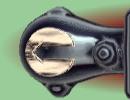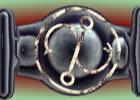
To Have a Good Vintage |

| “Sweet is the vintage when the showering grapes In Bacchanal profusion reel to earth, Purple and gushing.” Byron, Don Juan, c. 124. |
|
«Vinum bonum et suave, Bonis bonum, pravis prave, O quam dulcis sapor-ave! Mundana Iætitia! » Latin Songs, E. du Merit. |
He who would have a good vintage and fine wine, should take a horn full of wine and with this go into the vineyards or farms wherever vines grow, and then drinking from the horn, say:
| Italiano. | The Invocation |
|---|---|
|
Bevo ma non bevo il vino, |
I drink, and yet it is not wine I drink, |
This is a very interesting invocation and tradition, and probably of great antiquity from very striking intrinsic evidence. For it is firstly devoted to a subject which has received little attention — the connection of Diana as the moon with Bacchus, although in the great Dizionario Storico Mitologico, by Pozzoli and others, it is expressly asserted that in Greece her worship was associated with that of Bacchus, Esculapius, and Apollo. The connecting link is the horn. In a medal of Alexander Severus, Diana of Ephesus bears the horn of plenty. This is the horn or horns of the new moon, sacred to Diana. According to Callimachus, Apollo himself built an altar consisting entirely of horns to Diana.
The connection of the horn with wine is obvious. It was usual among the old Slavonians for the priest of Svantevit, the Sun-god, to see if the horn which the idol held in his hand was full of wine, in order to prophesy a good harvest for the coming year. If it was filled, all was right; if not, he filled the horn, drank from it, and replaced the horn in the hand, and predicted that all would eventually go well.1 It cannot fail to strike the reader that this ceremony is strangely like that of the Italian invocation, the only difference being that in one the Sun, and in the other the Moon is invoked to secure a good harvest.
[1. Kreussler, Sorbenwendische Alterthümer, Pt. 1. p. 272.]
In the Legends of Florence there is one of the Via del Corno, in which the hero, falling into a vast tun or tina of wine, is saved from drowning by sounding a horn with tremendous power. At the sound, which penetrates to an incredible distance, even to unknown lands, all come rushing as if enchanted to save him. In this conjuration, Diana, in the depths of heaven, is represented as rushing at the sound of the horn, and leaping through doors or windows to save the vintage of the one who blows. There is a certain singular affinity in these stories.
In the story of the Via del Corno, the hero is saved by the Red Goblin or Robin Goodfellow, who gives him a horn, and it is the same sprite who appears in the conjuration of the Round Stone, which is sacred to Diana. This is because the spirit is nocturnal, and attendant on Diana Titania.
Kissing the hand to the new moon is a ceremony of unknown antiquity, and Job, even in his time, regarded it as heathenish and forbidden which always means antiquated and out of fashion — as when he declared (‘Job 31:26, 27), “If I beheld the moon walking in brightness … and my heart hath been secretly enticed or my mouth hath kissed my hand … this also were an iniquity to be punished by the Judge, for I should have denied the God that is above.” From which it may or ought to be inferred that Job did not understand that God made the moon and appeared in all His works, or else he really believed the moon was an independent deity. In any case, it is curious to see the old forbidden rite still living, and as heretical as ever.
The tradition, as given to me, very evidently omits a part of the ceremony, which may be supplied from classic authority. When the peasant performs the rite, he must not act as once a certain African, who was a servant of a friend of mine, did. The colored man’s duty was to pour out every morning a libation of rum to a fetish and he poured it down his own throat. The peasant should also sprinkle the vines, just as the Devonshire farmers, who observed all Christmas ceremonies, sprinkled, also from a horn, their apple-trees.
  
|